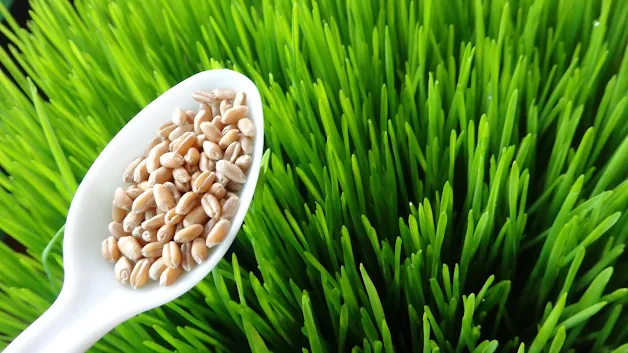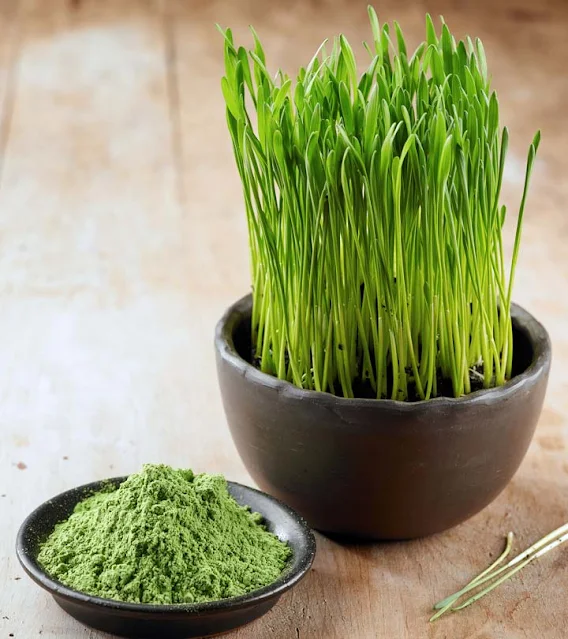The Nutritional Powerhouse: Unveiling the Health Benefits of Wheatgrass Juice
 |
| Health Benefits of wheat grass juice in Hindi |
Wheat Grass is the sprouted leaves of the wheat plant. Wheat grass is regarded as a super potent health drink with amazing benefits. It can be consumed both as juice or as a powder form. It can be used as everyday health tonic and may even help treat specific diseases. The choice is yours.
Health Benefits of Wheatgrass Juice
Wheatgrass juice, derived from the young shoots of the wheat plant, is celebrated for its numerous health benefits. Packed with essential nutrients, antioxidants, and enzymes, it has become a popular addition to health and wellness routines.
Here are some key health benefits of wheatgrass juice:
1. Rich in Nutrients
Wheatgrass juice is a concentrated source of vitamins and minerals, including vitamins A, C, E, K, and B-complex vitamins, as well as iron, calcium, magnesium, and amino acids. These nutrients support overall health and vitality.
2. Powerful Antioxidant Properties
Wheatgrass contains high levels of chlorophyll, which has potent antioxidant properties. Antioxidants help neutralize harmful free radicals in the body, reducing oxidative stress and lowering the risk of chronic diseases such as cancer and heart disease.
3. Boosts Immune System
The abundance of vitamins, minerals, and antioxidants in wheatgrass juice strengthens the immune system, enhancing the body's ability to fight infections and illnesses.
4. Detoxifies the Body
Wheatgrass juice is known for its detoxifying effects. The chlorophyll in wheatgrass helps cleanse the liver, purify the blood, and eliminate toxins from the body, promoting better organ function and overall health.
5. Improves Digestion
Wheatgrass juice aids digestion by stimulating the production of digestive enzymes. It also helps maintain a healthy gut flora, reducing digestive issues such as bloating, constipation, and indigestion.
6. Enhances Energy Levels
The high nutrient content in wheatgrass juice provides a natural and sustained energy boost. Unlike caffeine or sugar, wheatgrass juice delivers energy without the subsequent crash.
7. Supports Weight Loss
Wheatgrass juice can be an effective addition to a weight loss regimen. It helps control appetite, boosts metabolism, and provides essential nutrients while being low in calories.
8. Promotes Healthy Skin
The antioxidants and vitamins in wheatgrass juice contribute to healthy skin by preventing damage from free radicals, reducing inflammation, and supporting collagen production. This can result in clearer, more radiant skin.
9. Alkalizes the Body
Wheatgrass juice helps balance the body's pH levels by promoting alkalinity. A more alkaline body environment can improve health and reduce the risk of chronic diseases associated with high acidity.
10. Reduces Inflammation
The anti-inflammatory properties of wheatgrass juice can help reduce inflammation throughout the body. This can be beneficial for conditions like arthritis and other inflammatory diseases.
Wheat grass is a power pack drink. It is combination of nutrients which make it extremely useful to your health. It has antioxidants, anti bacterial and anti inflammatory properties.These nutrients help your body in getting rid of impurities and stored toxins. It increases the energy level of your body.It is very beneficial super drink which is truly natural and cures body naturally.
Wheat grass has high levels of enzymes that help in digestion by helping your body to break down food and absorb nutrients. It helps to relieve constipation and digestive issues.
Drinking wheat grass can boost your metabolism and helps your body in weight loss.It helps to reduce cravings.
Wheat grass can lower your cholesterol level. It can lower the risk of heart diseases. It boosts immune system, ward off infection and other diseases.

Wheat grass is a healthy natural drink by nature itself to serve humanity. It helps to recover more quickly, purifies blood, improves blood circulation. God gift for diabetics and cancer patients these days. It improves sugar level too. That is proved now. Now in villages people are following to grow wheat grass as remedy to cancer diseases. They are motivating other people to grow at your own home.
HOW TO TAKE AND ITS SIDE EFFECTS
We have read benefits but the question is how to take it and side effects.

It doesn't have side effects but before having it please consult your doctor or dietitian first. you have to drink 1 to 4 oz or 2 teaspoons a day if you are beginner. It is also in powder form. In powder form you can take 3 to 5 grams or 1 teaspoon. Quick drink is better than powder form so prefer to grow at home and blend it daily and have a fresh juice. It has anticancer potential newly researched so many companies are growing it as medicine as the demand is high these days.
So start now to drink it regular as nature has gifted you a brilliant health tonic.
How to Take Wheatgrass Juice
1. Fresh Juice:
- Preparation: Fresh wheatgrass juice is often prepared by juicing young wheatgrass shoots. It's best consumed immediately to retain maximum nutrients.
- Dosage: Start with a small amount, such as 1-2 ounces per day, and gradually increase the dosage to avoid any potential side effects.
2. Powdered Wheatgrass:
- Preparation: Wheatgrass powder can be mixed with water, juice, or smoothies. It's a convenient option for those who don't have access to fresh wheatgrass.
- Dosage: Follow the manufacturer's instructions, typically 1-2 teaspoons per day.
3. Wheatgrass Tablets or Capsules:
- Preparation: These are easy to consume and a good option for those who dislike the taste of wheatgrass juice.
- Dosage: Follow the dosage recommendations on the product label, usually 2-4 tablets or capsules per day.
4. Incorporating into Foods:
- Preparation: Wheatgrass can be added to salads, soups, or other recipes. However, it's most effective when consumed in liquid form.
Side Effects of Wheatgrass Juice
While wheatgrass juice is generally considered safe for most people, it can cause side effects, especially when consumed in large amounts or by individuals with specific sensitivities. Here are some potential side effects:
1. Nausea and Digestive Issues:
- Some individuals may experience nausea, stomach cramps, or diarrhea, particularly when first introducing wheatgrass juice into their diet. Starting with a small dose can help minimize these effects.
2. Allergic Reactions:
- Allergic reactions, although rare, can occur. Symptoms may include hives, swelling, or difficulty breathing. If you experience any of these symptoms, discontinue use and seek medical attention.
3. Headache:
- Some people report headaches after consuming wheatgrass juice. This could be due to detoxification effects or individual sensitivity.
4. Dizziness:
- Dizziness or lightheadedness may occur, especially if consuming large quantities of wheatgrass juice.
5. Change in Stool Color:
- The high chlorophyll content in wheatgrass can cause stool to appear green. This is harmless but can be alarming if unexpected.
6. Potential Contamination:
- Fresh wheatgrass juice can be contaminated with bacteria or mold if not grown or handled properly. It's important to source wheatgrass from reputable suppliers and ensure it's clean and fresh.
Precautions
1. Gradual Introduction:
- Start with small amounts to allow your body to adjust and to monitor for any adverse reactions.
2. Quality and Cleanliness:
- Ensure the wheatgrass is grown in a clean environment and properly washed before consumption.
3. Consult a Healthcare Provider:
- If you have underlying health conditions, are pregnant, or are breastfeeding, consult a healthcare provider before adding wheatgrass juice to your diet.
4. Monitor for Reactions:
- Pay attention to how your body responds and discontinue use if you experience severe or persistent side effects.
Incorporating wheatgrass juice into your diet can provide numerous health benefits, but it's important to consume it safely and be aware of potential side effects. Start slowly, choose high-quality products, and consult with a healthcare provider if you have any concerns.
Conclusion
If this article is beneficial for you please share it with family and friends. Like and follow me for more updates.
Incorporating wheatgrass juice into your daily routine can offer a myriad of health benefits, from boosting immunity and energy levels to promoting detoxification and skin health. Its rich nutrient profile makes it a valuable addition to a balanced diet and a healthy lifestyle.
Frequently Asked Questions
1. What is wheatgrass juice?
Wheatgrass juice is a liquid extract from the young shoots of the wheat plant (Triticum aestivum). It's known for its high concentration of vitamins, minerals, amino acids, enzymes, and chlorophyll.
2. How should I store wheatgrass juice?
- Fresh Juice: Freshly made wheatgrass juice should be consumed immediately for maximum benefits. If necessary, it can be stored in an airtight container in the refrigerator for up to 24 hours.
- Powdered or Tablet Form: Store in a cool, dry place away from direct sunlight and moisture to preserve its potency and shelf life.
3. Can I take wheatgrass juice every day?
Yes, wheatgrass juice can be taken daily. Start with a small amount (1-2 ounces per day) to allow your body to adjust, and then gradually increase the dosage if desired. Consistent daily intake can help maximize its health benefits.
4. Are there any side effects to taking wheatgrass juice?
While wheatgrass juice is generally safe for most people, some may experience side effects such as nausea, digestive issues, headaches, or allergic reactions. These effects are often mild and can be minimized by starting with a small dose and ensuring the wheatgrass is sourced from a clean environment.
5. Who should avoid wheatgrass juice?
Individuals with certain health conditions or allergies should be cautious:
- Allergies: Those with grass allergies or wheat sensitivities might react to wheatgrass.
- Pregnant or Breastfeeding Women: Should consult a healthcare provider before consuming.
- Medical Conditions: Individuals with conditions like celiac disease, gluten intolerance, or chronic health issues should seek medical advice before adding wheatgrass juice to their diet.
By addressing these common questions, you can better understand the benefits and considerations of incorporating wheatgrass juice into your health routine.
The Nutritional Powerhouse: Unveiling the Health Benefits of Wheatgrass Juice
